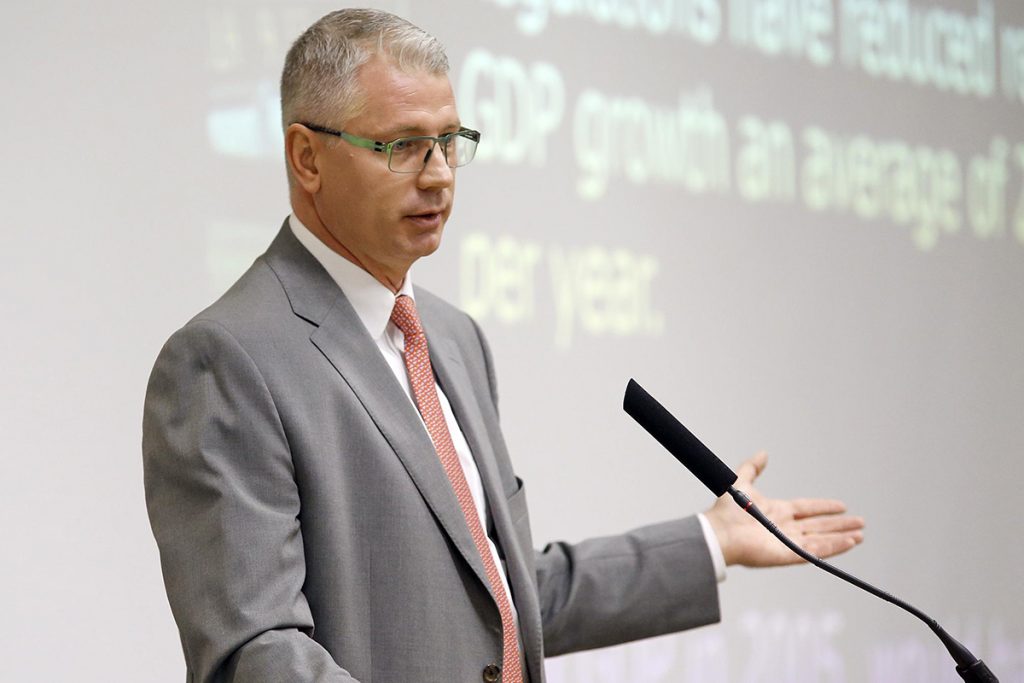BY ERIKA HODGES | JULY 24, 2020

ORLANDO, Fla. – The deepest recession since the Great Depression was also the shortest in U.S. history, but national economist and director of UCF’s Institute for Economic Forecasting Sean Snaith warns that climbing COVID-19 numbers and rolling back reopening phases poses real danger to economic recovery.
“Early on the curve was flattened, but the economy, in the process, was bulldozed by public health measures,” Snaith says. “Repeating those policies and shutdowns could turn a historic recession into the next depression.”
He predicts the U.S. economy, as measured by Real Gross Domestic Product, will be -5.2 percent in 2020 before accelerating to 6.6 percent in 2021 and then easing to 2.8 percent in 2022 and 2.2 percent in 2023.
The Institute for Economic Forecasting’s latest forecast also shows U.S. consumers are poised for solid spending growth and pent-up demand from consumers will be unleashed in the third quarter, leading to a 33.9 percent in growth.
“Following the lockdowns, U.S. consumers will be ready to spend,” Snaith says. “With household balance sheets recovering, lower oil/gasoline prices and historically low interest rates will help feed consumer spending growth, particularly in 2021.”
The public health shutdowns destroyed the best labor market in decades. Payroll job growth of -5.8 percent is expected in 2020, before climbing to 5.4 percent in 2021, 2.7 percent in 2022 and 1.8 percent in 2023.
Consumption spending is forecasted to shrink by 5.3 percent in 2020, then accelerate to 7.3 percent in 2021 before easing to 2.9 percent in 2022 and 1.8 percent in 2023. The Federal Reserve cut interest rates again to near zero in the face of COVID-19 induced recession. Stronger economic growth and eventual inflationary pressures from the Trump administration’s policies will eventually prompt interest rate hikes but not until 2024, according to the second quarter forecast. The federal funds rate will remain between zero and 0.25 percent through the end of 2023.
The housing market continues to progress and will improve through 2022. Ultra-low inventories and mortgage rates will underpin a late-cycle housing boost. The forecast notes housing starts will rise from 1.2 million in 2020 to 1.48 million in 2023.
The headline unemployment rate is expected to decline to 3.9 percent in 2023.
“Job growth will help ease the damage to the labor market from the lockdown,” Snaith says, “but the road to recovery will take several years. The economy was closing in on full employment, with acceleration of wage growth before the self-inflicted recession took its toll.”
For the complete U.S. report from the Institute for Economic Forecasting, visit business.ucf.edu/centers-institutes/institute-economic-forecasting/.
The Institute for Economic Forecasting strives to provide complete, accurate and timely national, state and regional forecasts and economic analyses.
Snaith is a national expert in economics, forecasting, market sizing and economic analysis who authors quarterly reports about the state of the economy. Bloomberg News has named Snaith as one of the country’s most accurate forecasters for his predictions about the Federal Reserve’s benchmark interest rate, the Federal Funds rate.
About the UCF College of Business
Established in 1968, the UCF College of Business offers degrees at the bachelor’s, master’s, doctoral and executive levels. All programs, as well as the Kenneth G. Dixon School of Accounting are accredited by AACSB International – the Association to Advance Collegiate Schools of Business. The college provides high-quality academic programs designed to give students a competitive advantage in the world of business now and in the future. Learn more at business.ucf.edu.